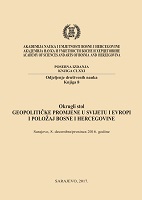HOĆE LI ZEMLJE „ZAPADNOG BALKANA“ OSTATI IZVAN EUROPSKE UNIJE?
WILL “WESTERN BALKAN” COUNTRIES STAY OUT OF EUROPEAN UNION?
Author(s): Mile Lasić
Subject(s): Regional Geography, EU-Approach / EU-Accession / EU-Development, Geopolitics
Published by: Akademija Nauka i Umjetnosti Bosne i Hercegovine
Keywords: The European Union after Brexit; model of “The Core of Europe“ vs. model of “Alliance of national states“; Suspension of the enlargement politics; future of the West-Balkan in the EU;
Summary/Abstract: At this point in time we can not talk about a certain future of the European Union, especially not in a context of structure and foundations that we have seen in a past 60 years of EU’s “marching” to the unknown. We can agree that during all these years EU has become “sui generis” legal (and political) system which is not a federation or confederation rather something “in between” – original political and economic integration and subject in international law which does not exclude member states rather includes them and making them more revitalized than they were before by taking them into the new governmental system – from multilevel governance which is based on the foundation of transferable or divisible sovereignty all the way to the space of integration “beyond the national state” and close to the “political unity” model. Al these processes of numerous “transnational pulsations” and socializations are starting within well-known identities and subjectivities which are transferred into cosmopolitanized society by including them all together with a final result of europeization of narratives and public policies. This is why this complicated system is not only part of special scientific area of European studies, rather it is studied as a part of political comparative studies. In the new “post-Brexit” circumstances it would be important not to give up easily on EU, rather remember that member states have previously faced with all kind of different problems and all kind of different crisis within EU structure and governance (EEA, EC, EU), which member countries have dealt with new treaties - meaning further integration and effective governance or further EU enlargement. Furthermore, in previous crisis there were live ideas of making EU as a “alliance of national states” but no one dared to question EU “as it is” – its legal acquis – what someone is trying to do now. Whether we are talking about old idea of German conservatives to make a EU on a model of “The Core of Europe” that implies that EU should have “two different speeds” (core or center and its periphery), or about the model of “the return of the transferred sovereignty” from the EU institution to the national states, both ideas would mean that togethers future of “twenty-eight” (if it comes to the Brexit at all), and further enlargements and integration is over in a way we know it now. These types of “solutions” would most tragically reflected on the “Western Balkan” countries, wither they have a “candidate status” or a “potential candidate status” as case is with Bosnia and Herzegovina or Kosovo. That’s why this papers mission is to question the destiny of “Western Balkan” after Brexit, with a small hope from the author that processes of further enlargements and integration of the EU are not belonging to the history.
Book: OKRUGLI STOL: GEOPOLITIČKE PROMJENE U SVIJETU I EVROPI I POLOŽAJ BOSNE I HERCEGOVINE
- Page Range: 29-41
- Page Count: 13
- Publication Year: 2017
- Language: Croatian
- Content File-PDF

